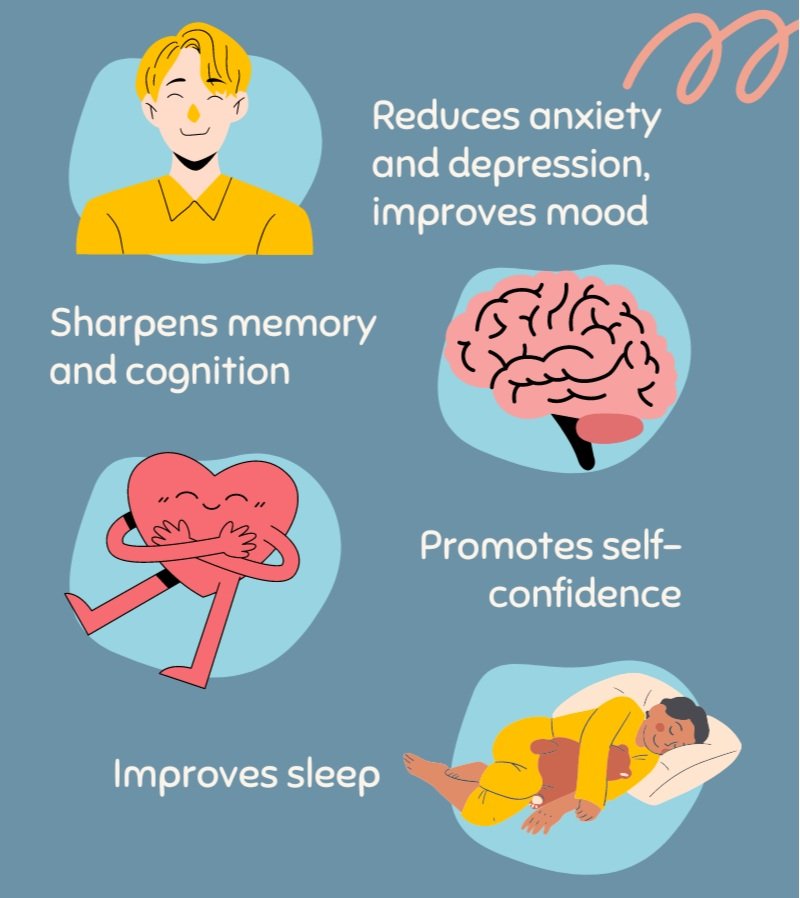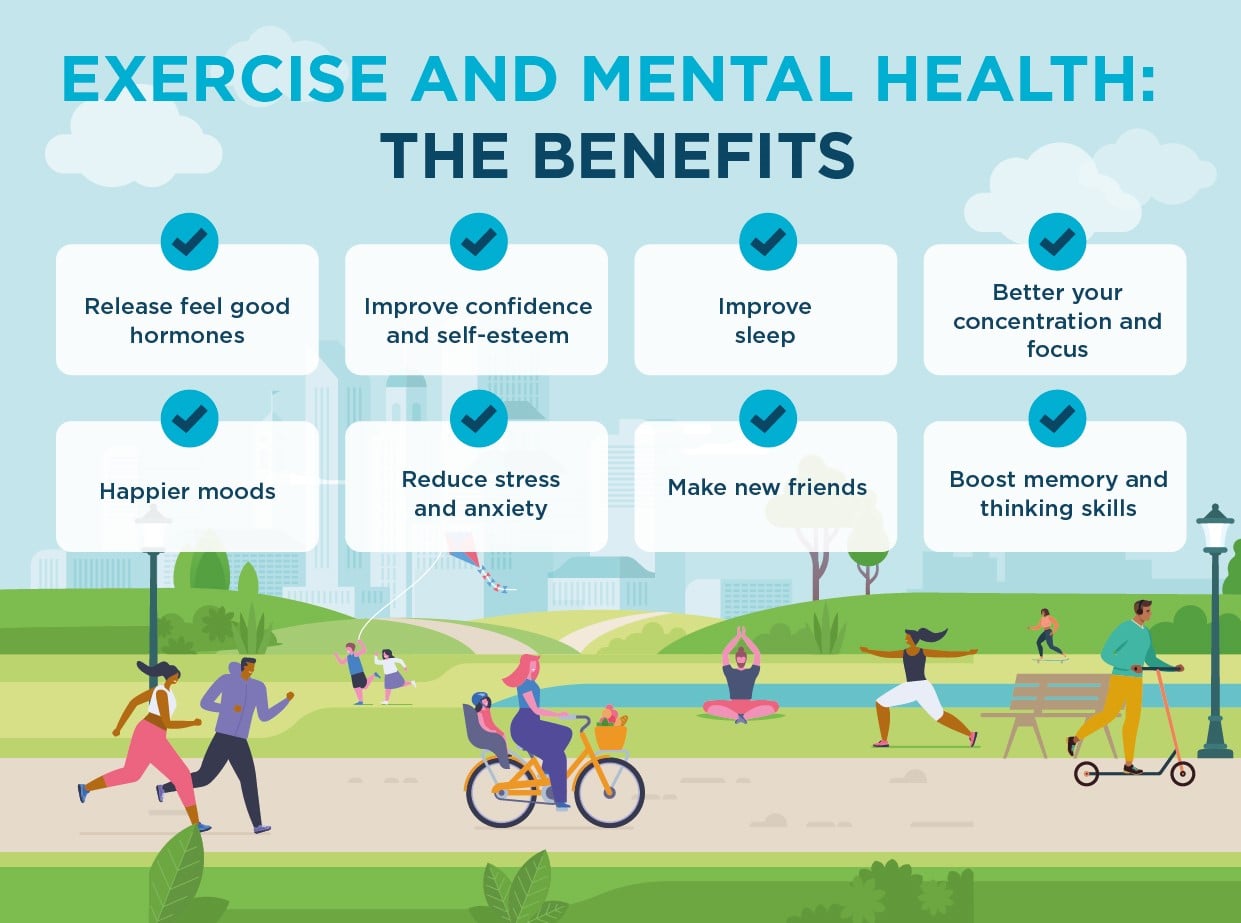Mental Fitness: Habits That Boost Mood & Reduce Anxiety
Mental fitness, much like physical fitness, requires consistent effort and the adoption of healthy habits. Cultivating a strong and resilient mind can significantly impact mood regulation and reduce anxiety. This involves actively engaging in practices that promote emotional well-being and cognitive function. By integrating these habits into daily life, individuals can enhance their overall mental health and develop a more balanced and positive outlook.
The Power of Mindfulness and Meditation

Mindfulness and meditation are powerful tools for reducing anxiety and improving mood. Mindfulness involves paying attention to the present moment without judgment. This can be practiced through various techniques, including focusing on the breath, observing thoughts and feelings as they arise, and engaging in mindful activities like walking or eating.
Meditation, a more structured practice, typically involves focusing on a single point of attention, such as the breath, a mantra, or a visualization. Regular meditation can help calm the mind, reduce stress hormones, and increase self-awareness. Studies have shown that meditation can alter brain structures associated with attention and emotional regulation.
Consistent practice, even for a few minutes each day, can yield significant benefits. Start with guided meditations available through apps or online resources, gradually increasing the duration as comfort grows.
The Importance of Physical Activity

Physical activity is not only beneficial for physical health but also plays a crucial role in mental well-being. Exercise releases endorphins, which have mood-boosting effects. Regular physical activity can also reduce stress hormones like cortisol and improve sleep quality, further contributing to reduced anxiety and improved mood.
The type of physical activity is less important than consistency. Choose activities that are enjoyable and sustainable, whether it's brisk walking, running, swimming, dancing, or practicing yoga. Aim for at least 30 minutes of moderate-intensity exercise most days of the week. Even short bursts of activity throughout the day can have a positive impact.
Different Forms of Exercise
Exploring different forms of exercise can help find activities that are both enjoyable and beneficial for mental health. Consider activities like:
- Yoga: Combines physical postures, breathing techniques, and meditation to promote relaxation and reduce stress.
- Tai Chi: A gentle form of exercise that involves slow, flowing movements, improving balance, coordination, and mental focus.
- Running: A cardiovascular exercise that releases endorphins and can improve mood and reduce anxiety.
- Swimming: A low-impact exercise that is easy on the joints and can improve cardiovascular health and reduce stress.
Nurturing Social Connections

Social connection is essential for mental well-being. Humans are social beings, and strong social connections provide a sense of belonging, support, and purpose. Loneliness and social isolation can contribute to anxiety and depression. Actively nurturing social connections can significantly improve mood and reduce feelings of isolation.
Make an effort to connect with friends and family regularly. Engage in meaningful conversations, participate in social activities, and offer support to others. Joining clubs, volunteering, or taking classes can also provide opportunities to meet new people and build social connections.
Prioritizing Sleep Hygiene
Adequate and quality sleep is critical for mental health. Sleep deprivation can impair cognitive function, increase irritability, and exacerbate anxiety and depression. Establishing good sleep hygiene can significantly improve sleep quality and, consequently, mental well-being.
Sleep hygiene involves creating a consistent sleep schedule, establishing a relaxing bedtime routine, and optimizing the sleep environment. Go to bed and wake up at the same time each day, even on weekends. Create a relaxing bedtime routine that includes activities like reading, taking a warm bath, or listening to calming music. Ensure that the sleep environment is dark, quiet, and cool.
Tips for Better Sleep
Consider these tips to improve your sleep hygiene:
- Avoid caffeine and alcohol before bed: These substances can interfere with sleep quality.
- Limit screen time before bed: The blue light emitted from electronic devices can suppress melatonin production, making it harder to fall asleep.
- Create a relaxing bedtime routine: This can include activities like reading, taking a warm bath, or listening to calming music.
- Ensure your bedroom is dark, quiet, and cool: These conditions are conducive to sleep.
Practicing Gratitude
Gratitude involves focusing on the positive aspects of life and appreciating what one has. Regularly practicing gratitude can shift focus away from negative thoughts and emotions, promoting a more positive outlook and reducing anxiety. Studies have shown that gratitude can increase happiness and life satisfaction.
Keep a gratitude journal and write down things you are grateful for each day. Express gratitude to others for their kindness and support. Take time to appreciate the simple things in life, such as a beautiful sunset or a delicious meal.
Setting Realistic Goals and Managing Time Effectively
Feeling overwhelmed by tasks and responsibilities can contribute to anxiety and stress. Setting realistic goals and managing time effectively can reduce feelings of overwhelm and promote a sense of control. Break down large tasks into smaller, more manageable steps. Prioritize tasks and focus on one thing at a time. Learn to delegate tasks when possible.
Using time management techniques, such as the Pomodoro Technique or time blocking, can help improve focus and productivity. Avoid procrastination and tackle tasks promptly. Celebrate small accomplishments to maintain motivation.
Limiting Exposure to Negative Information
Constant exposure to negative news and information can contribute to anxiety and stress. While it is important to stay informed, it is equally important to limit exposure to negativity. Be mindful of the sources of information and choose reputable sources. Limit the amount of time spent consuming news and social media. Focus on positive and uplifting content.
Seeking Professional Support When Needed
While self-care practices can be helpful, it is important to seek professional support when needed. If anxiety or mood problems are persistent or interfering with daily life, consider consulting a mental health professional. Therapy, medication, or a combination of both can be effective in treating anxiety and depression.
Remember that seeking help is a sign of strength, not weakness. Mental health professionals are trained to provide support and guidance in developing coping strategies and improving mental well-being.

Comments
Post a Comment